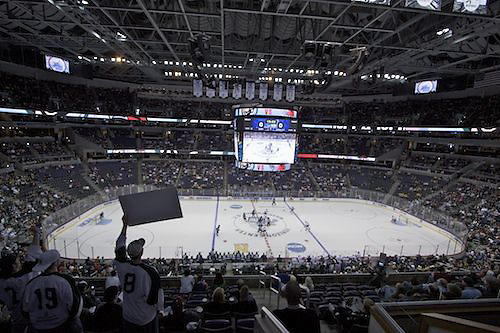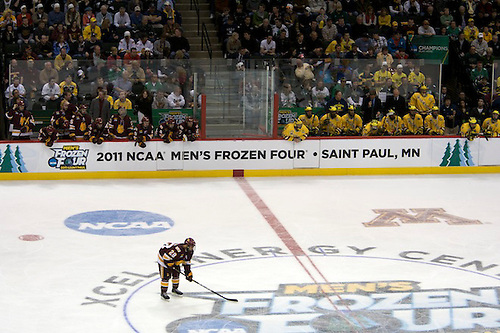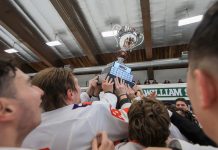
On Wednesday, the NCAA will award four cities with college hockey’s biggest weekend: the Frozen Four.
Four bids will be awarded for the 2015 through 2018 tournaments from a list of 10 finalists. There are compelling reasons for every city on the list, while each host also has its challenges.
The recommendations for the four hosts have been made by the NCAA Division I Men’s Ice Hockey Committee. The winning bids announced on Wednesday will be those ratified by the NCAA Championship/Sport Management Cabinet, which, according to NCAA’s associate director of media coordination and championships Mark Bedics, has the final say.
In advance of the announcement, here is my breakdown of each bid categorized three ways: Locks, strong consideration and long shots. Each bid is listed as the city and venue with the host organization in parentheses.
Locks
Boston, TD Garden (Hockey East/Massachusetts Sports Marketing Association)
Boston has to be considered one of the strongest favorites to host the Frozen Four and would be a smart decision for the 2015 event. The TD Garden has twice hosted the event (1998, 2004) and many were shocked when Boston was not awarded a bid in the last two rounds in 2005 and 2010.
Pros: Boston is not only an experienced host city, it is also one of the three main college hockey markets in the U.S. alongside Minneapolis/St. Paul and Detroit. The city is easily accessible by air and train, and getting around Boston on the city’s transit system, the MBTA, is appealing to fans. While the TD Garden is in an area by itself with limited accommodations and restaurants, Copley Square is just a short distance away with all of the top-tier hotel brands and plenty of restaurant and tourist-centric venues.
Cons: For one, Boston is a pretty pricey city. Though not as expensive as New York and Chicago, there are many more cost-effective options on the list of finalists. The other downside to Boston is the venue, the TD Garden. While an excellent building with an incredible hockey atmosphere, the Garden doesn’t have a large footprint, making hosting events like Fan Fest, a requirement in the NCAA bidding process, difficult. That said, if the NCAA was holding the lack of area for ancillary events against Boston, it wouldn’t have been placed on the list of finalists.
Washington, D.C., Verizon Center (Navy/Greater Washington Sports Alliance)
Anyone who attended the 2009 Frozen Four in D.C. walked away with rave reviews. That is the main reason I believe that D.C. and the Verizon Center are a lock to receive one of the four bids.
Pros: Washington, D.C., similar to Boston, brings with it a unique combination of ease of access (both to travel there and to get around) and a plethora of options for fans in terms of entertainment and sightseeing. The venue is right in the downtown area and is surrounded by hotels and restaurants. Notice that I haven’t even mentioned all of the historic buildings and tourist destinations. That, in my opinion, puts D.C. over the top. Most years, fans travel to the Frozen Four on Wednesday or Thursday and leave on Sunday. In 2009, that wasn’t the case for many who either booked time at the beginning or end of the trip to visit the government buildings, museums and other tourist destinations.
Cons: Similar to what I mentioned about Boston, Washington, D.C., is pricey in terms of accommodations and restaurants. Unlike Boston, there are alternative options for hotels that are easily accessible by the Metro, one of the best public transit systems in the country.
Strong considerations
St. Paul, Minn., Xcel Energy Center (Minnesota)
St. Paul has become synonymous with the Frozen Four after having successfully hosted the event five times in the past, twice at the Xcel Energy Center (2003, 2011). The city bleeds hockey, more so than any of the other finalists.

Pros: The Xcel Energy Center is one of the best NHL venues in the U.S. When that building is full, the atmosphere created for the student-athlete is like no other. The scene around St. Paul during a Frozen Four is unique and any fans that have attended the Frozen Four in St. Paul generally walk away with an incredible fan experience.
Cons: There are few accommodations options around the Xcel Energy Center and those in the area take advantage during major events, jacking up their rates significantly. The other option for hotels is Minneapolis, which has more than sufficient options, but there is no easy public transit option to get from Minneapolis to St. Paul. That should be different, though, by the time a Frozen Four would next be in St. Paul; a light rail connecting Minneapolis and St. Paul is scheduled to open in 2014.
Tampa, Fla., Tampa Bay Times Forum (Wisconsin/Tampa Bay Sports Commission)
I remember the reaction in 2005 when Tampa was announced as the host for the 2012 Frozen Four. Everyone looked at it as Anaheim Part II. I also remember listening to fans, participating teams and media after the tournament concluded. Most gave the host city a raving endorsement.
Pros: The Tampa Bay Times Forum is an excellent venue to watch hockey. The fan base in the area is engaged in the Lightning and was impressively engaged in the 2012 event. But the most important component to Tampa’s bid is the strong relationship the NCAA has with the Tampa Bay Sports Commission. Its executive director, Rob Higgins, was part of Tampa’s bid in 2005 and was still part of the organization to see through its execution (he remains the executive director today). This city got it right in 2012. Add to it that everything is compact — the venue, hotels and restaurants are within walking distance — and you have to think Tampa will again get strong consideration.
Cons: Weather, though you would think it would play in Tampa’s advantage, can be a downside. Fans don’t relate the Frozen Four and 80 degree temperatures. Personally, I think that is a small downside. The bigger one may be that Tampa just hosted the event. The only chance Tampa has is the 2018 bid, which would give a six-year cushion between events (the shortest in recent years was four when Milwaukee hosted in 1993 and 1997).
Chicago, United Center (Notre Dame/Chicago Sports Commission)
Chicago is the only city that hasn’t hosted this event that I don’t consider a long shot. The Windy City supports hockey with great passion, particularly given the Blackhawks’ two Stanley Cups in recent years.
Pros: Chicago is easy to access via plane, with two airports and two of the nation’s largest airlines, American and United, calling Chicago a hub. It has plenty to offer the fans and, once downtown, Chicago is easy to navigate. There are plenty of hotel and restaurant options that will keep fans entertained. Additionally, Chicago is dead center of Big Ten country, something that could be considered by the NCAA given the league’s recent entry into college hockey.
Cons: Chicago, like others, is an expensive city and there aren’t a ton of convenient alternatives for accommodations (though if you find a hotel on the public transit, the system is pretty good). Personally, I’ve never been to the United Center and I’ve been told that the area around the arena isn’t the best part of town. That, though, didn’t seem to play into the NCAA’s decision when picking Detroit back in 2005.
Long shots
Brooklyn, N.Y., Barclays Center (ECAC Hockey)
With Brooklyn becoming one of the trendiest boroughs of New York City and the impending move of the New York Islanders to Brooklyn, I’m not surprised to see the Barclays Center on the list of finalists. That said, I strongly feel this would be a mistake should the NCAA take the Frozen Four there.
Pros: New York City. That’s it. If the NCAA brings the Frozen Four to Brooklyn it is almost entirely to bring an event into the nation’s largest media market. That said, being in the market doesn’t always translate to better media exposure. Would the NCAA tour finalists around the morning shows and, moreover would the morning shows even have an interest in the Frozen Four? Yes, this is a new building that would be accessible via public transportation (although, assuming most would stay in Manhattan, that’s still a pretty long ride). But nothing about this location makes sense.
Cons: The expense of New York City is No. 1. That should translate to the NCAA as cutting into its profits on the event, something you have to think would resonate. And while getting to NYC is easy, getting around is not. The public transit city, while broad stretching, is confusing. The Barclays Center will have a capacity of 15,813 for Islanders games, well below the 18,000 minimum for the Frozen Four. There is a chance, like the TD Garden capacity, that the capacity number does not include club and luxury box seats and thus, when counted the actual capacity would exceed 18,000.
Buffalo, N.Y., First Niagara Center (Metro Atlantic Athletic Conference/Canisius/Niagara)
Buffalo is bidding to host its second Frozen Four, having played host in 2003 when Minnesota defeated New Hampshire to win the title in back-to-back years. The bid would have the same hosts as 2003 — the MAAC along with Canisius and Niagara, despite the MAAC no longer sponsoring college hockey.
Pros: The First Niagara Center (nee HSBC Arena) is a great facility located right in downtown Buffalo. The city’s proximity to the Canadian border makes for easy trips to Toronto or Niagara Falls on off days. There is a definite push for college hockey in downtown Buffalo since an agreement was signed last summer between Canisius and the Buffalo Sabres to build the Harbor Center, a rink that will serve as the Sabres practice facility and Canisius’ home rink.
Cons: Buffalo as a destination is pretty sleepy. Personally, I couldn’t remember back to 2003 too well but did recently attend the World Junior Championship when it was played in Buffalo and wasn’t overly impressed by the city. Additionally, traveling to Buffalo is difficult. There are few non-stop flights, which often makes it an expensive destination. Of the five schools I have listed in the “long shots” category, I would probably mind going to Buffalo the least (c’mon, I’m a big fan of buffalo wings), but I think there are too many better bid cities to award Buffalo this time.
Columbus, Ohio, Nationwide Arena (Ohio State/Columbus Sports Commission)
Many people will remember the Columbus Frozen Four in 2005 as the rare Frozen Four to be hosted on a college campus. That year, the event was played at Ohio State’s Value City Arena and will most be remembered as the Frozen Four where all four participants came from the WCHA.
Pros: Moving the event from Ohio State to the downtown Nationwide Arena, the NHL home of the Columbus Blue Jackets, significantly improves this bid. That said, downtown Columbus still isn’t a desirable destination. It is relatively easy to travel to Columbus with Delta using the airport as one of its hubs. And there are plenty of reasonably priced accommodation choices that are within a short walk of the arena.
Cons: It’s Columbus. That simple. When you look at cities like Boston, St. Paul and Chicago, it’s difficult to make any sort of comparison to Columbus. I have been to Nationwide Arena for an NHL Entry Draft and the building is more than sufficient to host a Frozen Four, but I just have a difficult time putting Columbus high on this list of finalists.
Pittsburgh, Consol Energy Center (Robert Morris) and Philadelphia, Wells Fargo Center (Penn State/Philadelphia Sports Congress)
I group these two cities together for a pretty simple reason: At the end of this year, these will be the two most recent hosts. Pittsburgh did more than an adequate job of hosting last season. We’ll reserve judgment on Philly until this year’s event is over.
Pros: For Pittsburgh, the obvious pro is the arena. The Consol Energy Center is easily the nicest NHL arena in which I have watched hockey. I also liked the area around the arena and the ease of walking from the hotel to the arena. It didn’t strike me as an incredible tourist destination but the city certainly embraced hockey.
For Philadelphia, I will admit I don’t have a lot of knowledge of the area. I’ve been to the city just once and that was for an AHL game nearly 20 years ago. I will say, they love their hockey in Philly.
Cons: The obvious for both is the proximity to when each last hosted. Fans want different destinations for this event so to know that you’d possibly go to Philly twice in four years when there are so many other qualified options available is unappealing. While both cities are hubs for US Airways, there are still limited non-stop flights from most cities. But when voting down these two finalists, it’s simple: It’s just too soon.
Cities I wish were finalists
There are a number of cities (both NHL and non-NHL) that I wish were on this list.
Milwaukee is obviously missing. Having hosted the event three times between 1993 and 2006, Milwaukee produced an atmosphere that was among the best.
Nashville considered a bid but, alas, did not. I had the chance to cover an NHL draft in that city and fondly remember the southern hospitality.
Denver was a very good host in 2008 but was glaringly missing from this year’s list of finalists.
Providence, R.I., no longer qualifies because of the small capacity at the Dunkin’ Donuts Center (12,400). But anyone who attended a Frozen Four in Providence remembers the quaint nature of the city, the ease of getting around and an electric venue given its size. A recent renovation was on display at last year’s East Regional and the building showed well.
When the NCAA makes the announcement of the awardees on Wednesday there will be some happy and some not-so-happy fans. But anyone who has attended more than one Frozen Four knows that the way college hockey takes over that city creates enough of an experience to make it enjoyable.


